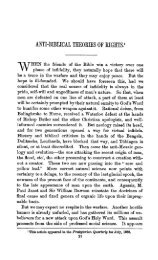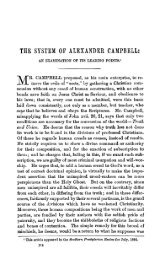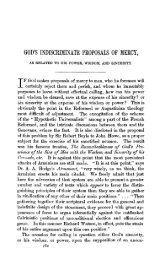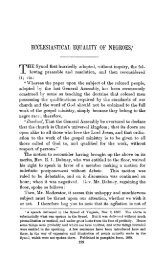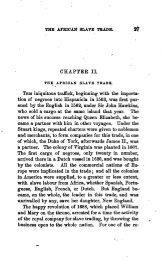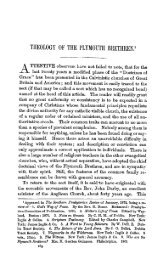The Latest Infidelity.pdf 487KB May 19 2009 - R.L. Dabney Archive
The Latest Infidelity.pdf 487KB May 19 2009 - R.L. Dabney Archive
The Latest Infidelity.pdf 487KB May 19 2009 - R.L. Dabney Archive
You also want an ePaper? Increase the reach of your titles
YUMPU automatically turns print PDFs into web optimized ePapers that Google loves.
618 THE LATEST INFIDELITY.<br />
drunkard's gastritis? But those are avowedly penal. Once<br />
more, Colonel Ingersoll on his theory would have to explain the<br />
imprisonment which he visits on a felon, as precisely parallel<br />
to the detention in a quarantine ship of a virtuDus citizen who<br />
has just had the bad luck to sail recently from a yellow-fever<br />
port. Are the two inflictions precisely the same expediences<br />
for the public good, equally unfounded on an imputation of<br />
guilt to the sufferers? That is the explanation to which his<br />
philosophy would lead him; but he dare not accept it. He<br />
knows that the virtuous traveler is detained in spite of his in-<br />
nocence; but the felon is detained because of his guilt. Be<br />
who says that the natural evils incurred by misconduct are not<br />
penalties, but mere consequences, ought also tD say that evils<br />
which society, itself a natural institution, inflicts on criminals<br />
are also mere consequences, and not just penalties. But against<br />
this every conscience revolts.<br />
Our second point of objection is: that Colonel Ingersoll's<br />
doctrine about natural -evils, if true, would be unspeakably<br />
harsher and more repulsive than the Christian doctrine, which<br />
he thinks too harsh to be endured. For, first, it places us er-<br />
ring mortals not under the dominion of a righteous personal<br />
will, which is also wise, benevolent, and merciful, but under the<br />
rule of invariable natural laws. Under these, the evils which<br />
men experience, saith he, are not penalties, but mere conse-<br />
quences. Now a code which has no penalties of course has no<br />
pardons. <strong>The</strong>re is no room in it for the conception of forgive-<br />
ness. It tells a suffering transgressor that, when once his mis-<br />
take is made, his suffering must be as inevitable as the attrac-<br />
tion of gravitation or the rotation of the earth. Can mere na-<br />
tural law hear a prayer? Does it understand repentance? Can<br />
it feel pity? Ask the ocean storm or the devouring Are these<br />
questions. Here truly we have humanity with a vengeance!<br />
<strong>The</strong> skeptic is too humane to endure the conception of penal<br />
chastisement directed *by a personal God, who is both just and<br />
merciful; and to help matters, he proposes to consign his fellow-<br />
creatures to the iron and remorseless dominion of natural law,<br />
which is equally ignorant of repentance, mercy, and forgive-<br />
ness. But, he says, let the erring man reform his mistake, and<br />
thereby he will emerge from the painful consequences. Is this<br />
true? Does he not know that the constant tendency of natural



